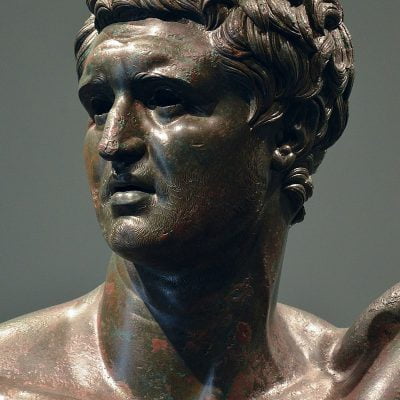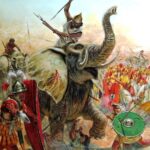Chapters
Scipio Africanus the Younger was born in 185 CE. His full name was Publius Cornelius Scipio Emilian African Younger (Publius Cornelius Scipio Aemilianus Africanus Minor). He became famous as the ultimate vanquisher of Carthage in the Third Punic War. A spokesman for old Roman ideals, a supporter of Hellenistic culture, and a stoic and an excellent orator at the same time.
Family and early career
He was the second son of Lucius Aemilius Paulus, who was the victorious general under Pydna (168 BCE), and his first wife Papiria. He was adopted by the son of Scipio African Elder. Already at the age of seventeen, he fought alongside his father in the battle of Pydna. His wife was Sempronia, the sister of Tiberius and Gaius Gracchi.
In 151 BCE, at the age of 34, he fought in Spain as a military tribune.
Third Punic War
After Rome declared war on Carthage, he came to Africa as an officer in 149 BCE. There, he earned his honour as a consul in 147 BCE, when the Third Punic War was already lasting for the third year. Appian of Alexandria in “Roman History” described the Carthaginians’ preparations for war:
Quickly all minds were filled with courage from this transformation. All the sacred places, the temples, and every other unoccupied space, were turned into workshops, where men and women worked together day and night without pause, taking their food by turns on a fixed schedule. Each day they made 100 shields, 300 swords, 1,000 missiles for catapults, 500 darts and javelins, and as many catapults as they could. For strings to bend them the women cut off their hair for want of other fibers.
– Appian of Alexandria, Roman history, XIX.93
Scipio the Younger immediately started to act vigorously. A brilliant attack in 146 BCE stormed into the city and seized it. Thus he ended the 4-year-long Third Punic War. After returning to Rome, he triumphed and was nicknamed “Africanus”.
During the last months of the siege, many Carthaginians died as a result of the famine in the capital of Carthage. Scipio wanted to keep Carthage, but this did not meet with the support of the Senate. Carthage, by order of the Roman Senate, was completely destroyed (the demolition of the city lasted 17 days), and the land on which the city was cursed. The territory of the former state was transformed into a new province of Africa, and the inhabitants were displaced, murdered, and the survivors (50,000) were sold into slavery. Carthage was annexed and, according to the Roman system, transformed into the province of Africa.
Further career
In 134 BCE he became a consul again. In the same year, he left for Spain as a commander in the war against Numacea. He won it in 133 BCE. In the same year, he triumphed in Rome and received another nickname “Numantibus”.
In 142 BCE became a censor. He was a lover and patron of Greek culture and philosophy. He was friends with Terentius, the poet Lucylius, the historian Polybius and the philosopher Panaetius around him. Together with other prominent figures of Rome, he created the circle of Scipio.
In 129 BCE he lost support because he opposed the agrarian reforms of Tiberius Gracchus.
Death
He died suddenly in 129 BCE, and his death remains unexplained, it is believed that he was murdered by supporters of the Gracchians.
Scipio was an opponent of the agricultural reforms of the Grakch brothers, consisting in granting plots of agricultural land to the commoners. Like his foster father, he was a supporter and promoter of Greek culture. The Carthaginian state, reborn after the Second Punic War, disappeared from the maps, opening the way for further Roman expansion in Africa. His shares in Spain increased Roman ownership in the province. He was one of the founders of the later powerful Roman Empire.








